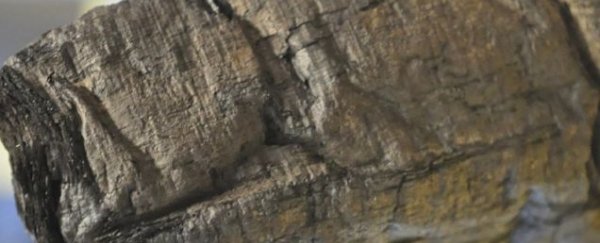Back in 79 AD, Italy's Mount Vesuvius erupted, destroying several Roman towns along the Bay of Naples, including Pompeii and Herculaneum, and causing an estimated 16,000 deaths. Famously, the eruption was so fast that it essentially "froze" entire towns in place, coating them in lava in their final moments, where they can still be seen today.
Among the treasures that were buried was a library in the Italian town of Herculaneum, which contained thousands of handwritten, carbonised papyrus scrolls. It was the only rich book collection to survive the eruption.
These lava-coated scrolls were first discovered in 1752, but they're so fragile that it's never been possible to read them without destroying them.
But now scientists have developed a new imaging technique, known as X-ray phase-contrast tomography, that allows them to read the text written on the scrolls without having to unwrap the historical texts.
The video below shows the incredible non-invasive process, which has been described in Nature Communications, in action.

Importantly, what they've read so far shows that the scrolls contain Greek prose and poetry on Epicurean philosophy by Philodemus, a teacher and philosopher who was born in the first century BC in what is now Jordan.
Epicurus was another Greek philosopher who lived around 300 BC and who promoted pleasure as the main goal of existence, didn't believe in the afterlife and encouraged study of the natural world. Philodemus was an important interpreter and teacher of Epicurus's work.
There is now doubt over whether these scrolls were part of Philodemus's personal collection, or whether they were first century AD copies. But either way, it's an important discovery. And there are hundreds more scrolls, some in Latin rather than Greek, to read.
"Anybody who focuses on the ancient world is always going to be excited to get even one paragraph, one chapter, more," Roger Macfarlane, a classicist at Brigham Young University in the US, told the Smithsonian magazine. "The prospect of getting hundreds of books more is staggering."
Importantly, the technique that allowed researchers to read these ancient scrolls can now be used to unveil the secrets of other fragile texts and documents from throughout history. For example, the biblical texts that scientists recently uncovered in an Egyptian mummy mask.
Just imagine the secrets it could reveal…
Sources: Smithsonian
